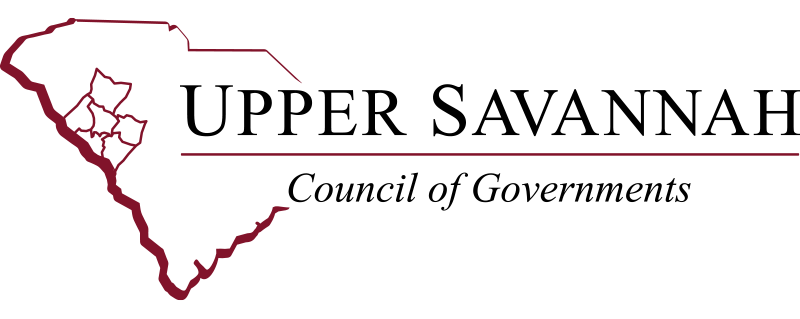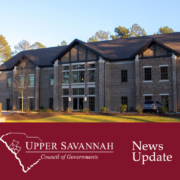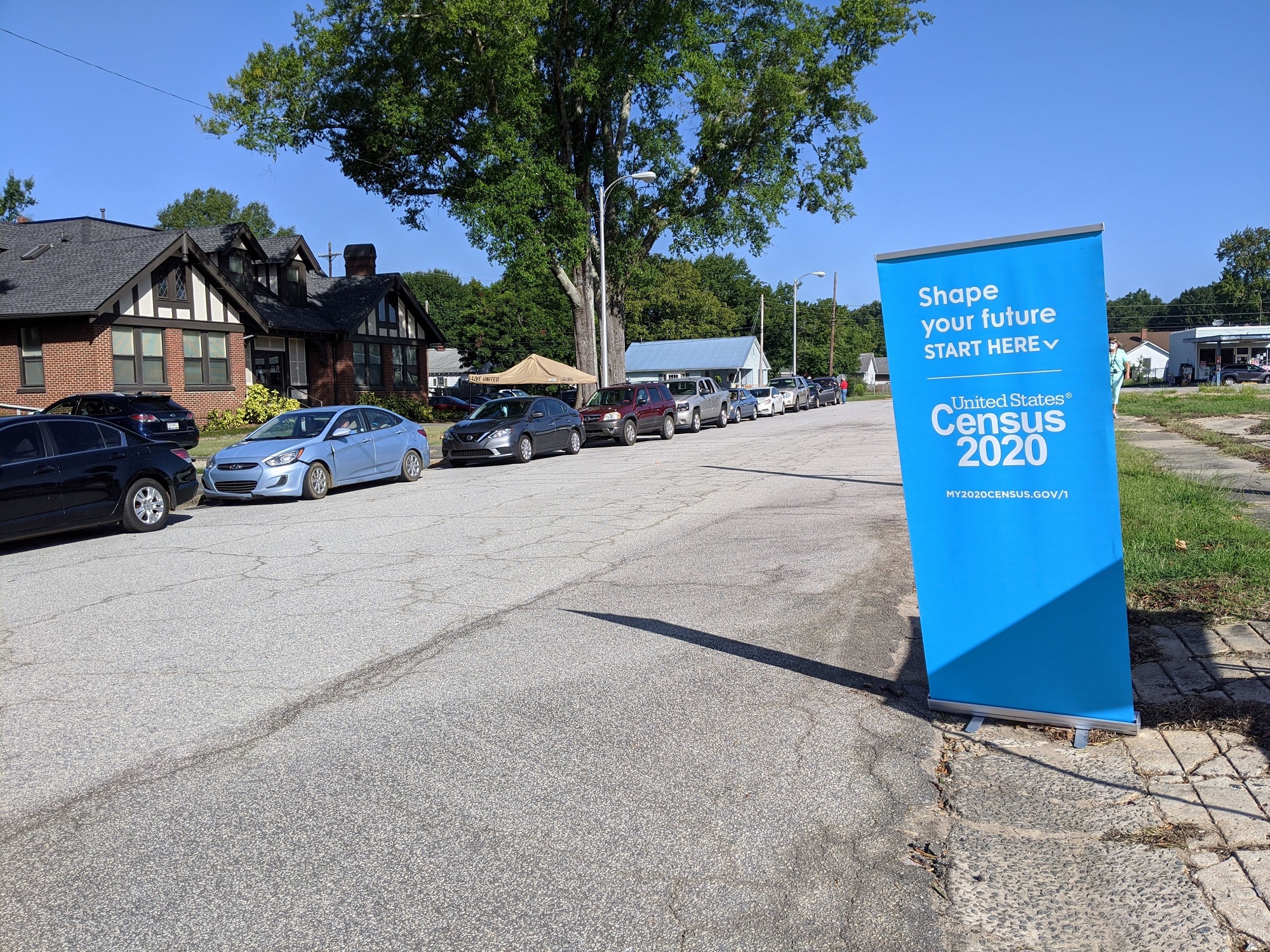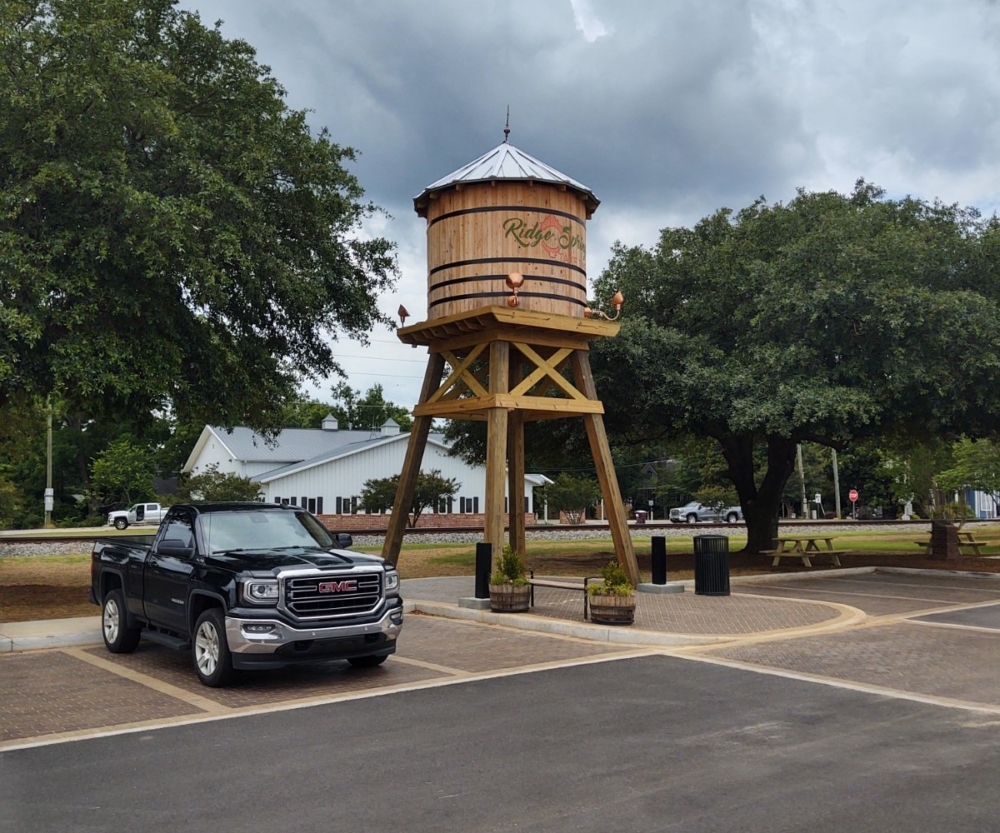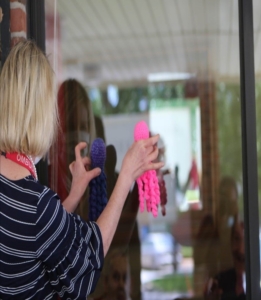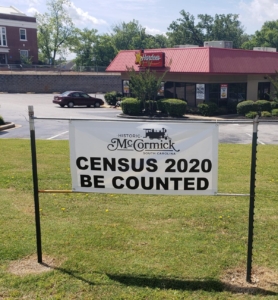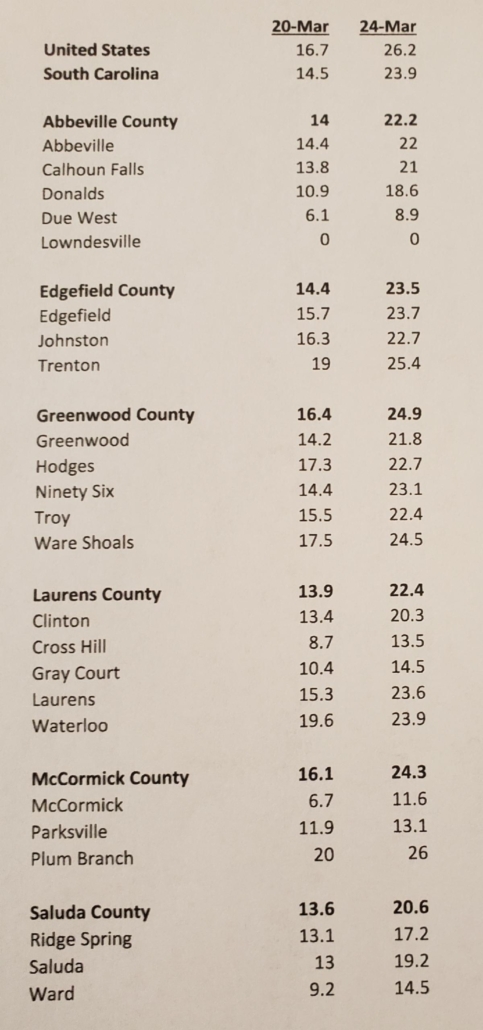Government Services
Social distancing requirements have changed the Census 2020 schedule and the way public meetings are held, according to Government Services Director Rick Green.
The Census Bureau temporarily suspended Census 2020 field data collection activities in March, according to Green. Steps are already being taken to reactivate field offices beginning June 1, 2020, in preparation for the resumption of field data collection operations. The Census Bureau has extended the window for field data collection and self-response to October 31, 2020, so people can still fill out their Census form online at my2020census.gov, or over the phone at 1-844-330-2020.
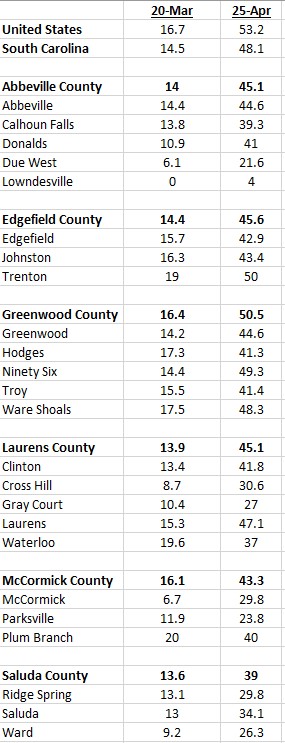
Census 2020 Response Rates
The latest Census response rates are listed in the accompanying table.
Green has followed media reports of how public meetings are being handled and has fielded phone calls.
“There have been several questions about how to hold a public meeting during these restrictions,” Green explained. “Planning commissions often have time-sensitive proposals sent to them that require specific action within a certain time frame or the proposal is deemed approved by the planning commission.
“For instance, if a developer applies to a planning commission for a new subdivision, the commission has to either vote yes or no on the application within 60 days or the project is considered approved and moves on to the next phase. If both parties agree to a time extension, that can help, but that is not always possible.
“Social media and programs like Zoom are popular, but not everyone is internet savvy and technology often has glitches,” Green continued.
“I have read media reports about meetings occurring with some elected or appointed officials in the Chamber and some appearing from the internet.
“I have also heard of meetings continuing with strict physical distancing requirements observed by both officials and the public. Local governments should work closely with their attorney for the best advice on how to run public meetings in their community.”
Workforce Development
Workforce development staff and partner agencies are highly affected by the COVID-19 pandemic as more than 12,000 workers in the Upper Savannah Workforce Area have applied for unemployment.
The need for assistance is widespread due to furloughs caused by the temporary closures of restaurant dining and many other businesses, plus temporary and possibly even permanent closures of some companies.
Unemployment claims in the Upper Savannah area between March 21 and April 18 are 12,151.
 Upper Savannah workforce staff is working actively in several areas, including conducting employer outreach to connect businesses with workers if they are hiring, or to unemployment information if they are furloughing workers.
Upper Savannah workforce staff is working actively in several areas, including conducting employer outreach to connect businesses with workers if they are hiring, or to unemployment information if they are furloughing workers.
Staff is providing additional recruitment support for businesses that are leading COVID-19 recovery efforts. These businesses have included medical equipment manufacturers, companies that make components for safety equipment, and food suppliers.
Upper Savannah has been echoing the message from the S.C. Department of Employment and Workforce (SCDEW) and other partners to inform job seekers about resources such as unemployment insurance (UI), remote Wi-Fi access points, community resources and small business loans. COVID-19 related content has been added to the Upper Savannah SC Works Facebook page.
Staff has revised internal procedures at SC Works Centers in each Upper Savannah region county so workforce staff can offer Workforce Innovation and Opportunity Act (WIOA) services remotely.
Staff has also developed the capability to equip current clients with technology and access to technology so they can study at home.
In addition, staff have ramped up the training of key medical personnel to deepen the labor pool and has requested additional Rapid Response funding to offer On-the-Job Training to dislocated workers.
Community Development
Social distancing requirements have affected the Community Development Block Grant (CDBG) process as USCOG Community Development staff prepare applications for sewer improvement projects in the City of Clinton and in Greenwood and Laurens counties.
The S.C. Department of Commerce has extended the CDBG infrastructure funding application deadline to June 15, 2020. This round of applications typically due in April requires door-to-door income surveys for qualification purposes, according to Community Development Coordinator Brittany Hallman.
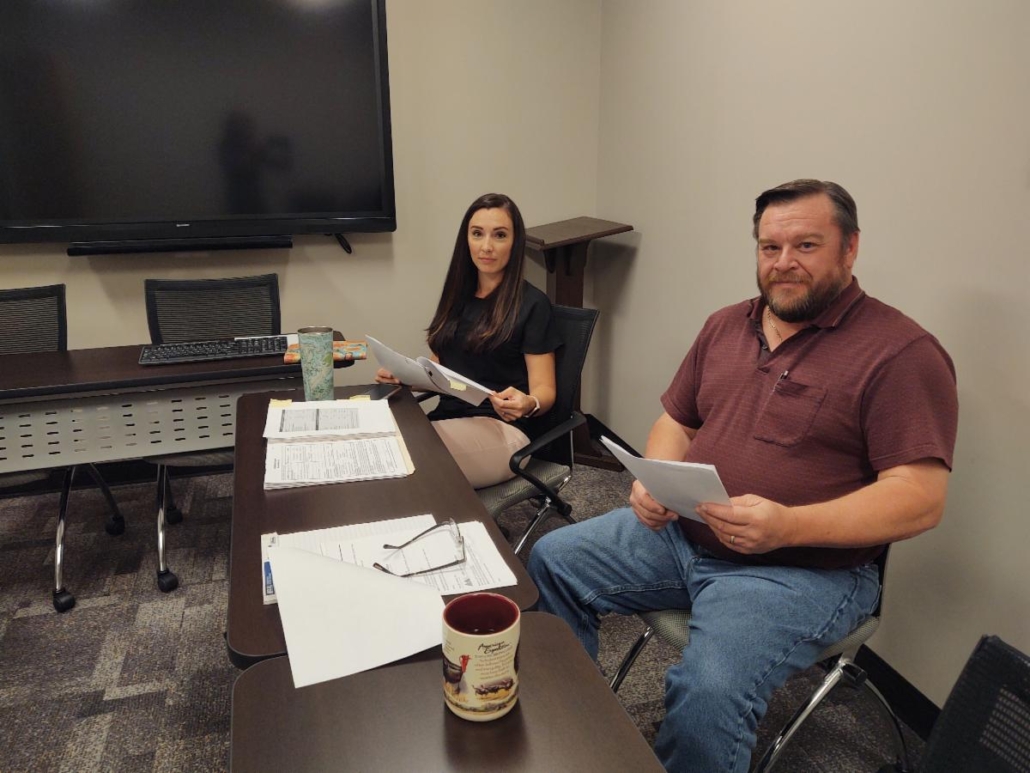
Community Development Director Keith Smith and Community Development Coordinator Brittany Hallman hold a required public hearing for one of the CDBG applications via the virtual platform Zoom.
Currently, entities and subrecipients are working to obtain the required surveys to meet the new deadline, while complying with the restrictions of COVID-19. They are using additional resources such as mailing income surveys to households that benefit from the CDBG projects.
As part of Department of Housing and Urban Development (HUD) requirements, USCOG staff is required to hold public hearings for the application submission. HUD has allowed CDBG recipients to use a virtual meeting platform to hold hearings. The virtual platform chosen at this time is Zoom. Application hearings for the CDBG infrastructure applications were held the week of April 20, with 27 people attending one of the hearings.
Meanwhile, the Planning Grant deadline was extended to June 5, 2020. Application hearing for this grant will also be held on Zoom. Upper Savannah is working to close-out the current Planning Grant and submit a new application on or before the extended deadline.
The Planning Grant allows continued CDBG support to the Upper Savannah region. This allows CDBG staff funding assistance to work with local governments for project development, needs assessments and technical assistance in the CDBG program.
“This particular grant isn’t highly impacted by the current COVID-19 situation,” Hallman said. “The S.C. Dept of Commerce is still functioning as well as the local governments. As long as these entities are still functioning, USCOG is able to close out and submit the required documents for this particular application.”
Aging
Perhaps no other group has been more affected by the pandemic than seniors, who have been encouraged to stay home due to their vulnerability to COVID-19. Therefore, senior center group dining sites are temporarily closed.
Home-delivered meals (HDMs) continue to be provided to homebound seniors and during the pandemic, HDMs are also being provided to the group dining participants, Area Agency on Aging (AAA) Director Linda McAllister said.
Additional funding allowed the Upper Savannah AAA to serve around 50 seniors who were previously on the home-delivered meals waiting list, enabling these additional seniors to receive meals during this state of emergency.
Essential transportation services continue to be available to clients. The AAA has halted Minor Home Repair services but continues to provide all other services in the region.
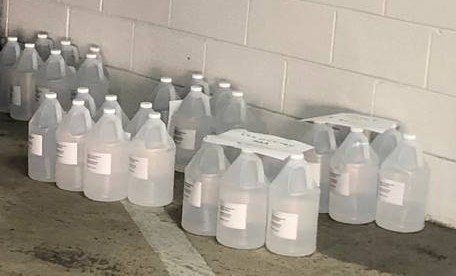
Hand sanitizer provided by SC Dept.
on Aging for use in state’s senior centers
“The South Carolina Department on Aging provided hand sanitizer to all of the Area Agencies on Aging in the state,” said McAllister, who replaced retiring AAA Director Vanessa Wideman April 1.
“We distributed a gallon (of hand sanitizer) to each of our senior centers in the region to be used by staff and volunteers on the front-line delivering meals and transportation to our seniors,” McAllister said. “Hats off to our providers, their staff and volunteers for continuing to serve our seniors.”
Economic Development
The EDA funded projects in the Upper Savannah region continue to progress without interruption. However, the Economic Development Division’s Revolving Loan Fund (RLF) has been affected by COVID-19.
The Project Café Infrastructure Project (water and sewer service to Teijin) was substantially completed in November and is now in the closeout phase, according to Economic Development Director Sam Leaman.
The Piedmont Technical College Upstate Center for Manufacturing Excellence is due to be completed on May 1.
At the same time, projects in Abbeville and Laurens counties are mobilizing for construction start. These include the Long Cane Creek Wastewater Treatment Plant Upgrade, Stagecoach Road Waterline and the Milam Road Elevated Water Tank.
RLF borrowers who need assistance due to economic slowdowns are getting help.
“Our small business borrowers are experiencing challenges as you might expect,” Leaman said. “After speaking with all borrowers, we identified five that were experiencing severe economic distress.
“For these, we offered a short-term payment deferral,” he explained. “Thankfully, some businesses had not experienced any downturn in sales and have been able to make their regular payments on schedule and more importantly maintain their workforce.”
